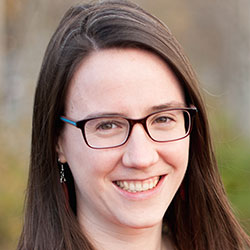 Events
EventsDesigning Computing Education for Everyone
HCI+D event explores unique approaches to broaden participation in computing

The landscape of computing education is shifting from a historical focus on formal pipelines to train professional software developers to a core literacy approach that recognizes computing’s value for all learners.
Highlighting perspectives around designing tools, curricula, and learning communities for everyone, the Northwestern University Center for Human-Computer Interaction + Design (HCI+D) hosted a virtual panel on June 8 to discuss the role of thoughtful design in attaining interest, engagement, participation, and retention in computing more broadly.
A collaboration between Northwestern Engineering and Northwestern’s School of Communication, HCI+D is led by codirectors Elizabeth Gerber, professor of mechanical engineering in at the McCormick School of Engineering and professor of communication studies in the School of Communication, Darren Gergle, John G. Searle Professor of Communication Studies in the School of Communication, and Bryan Pardo, professor of computer science at Northwestern Engineering and professor of radio, television, film in the School of Communication.

The event’s three panelists — Tiffany Barnes, Betsy DiSalvo, and Mark Guzdial — shared their experiences tackling computing education questions related to equity, scale, and context across K-12 and higher education through the lenses of responsible computing, learning sciences, participatory design, and human-centered computing.
Achieving equitable computer science and AI education
Barnes is a Distinguished Professor of Computer Science at North Carolina State University and codirector of the STARS Computing Corps, a consortium of universities launched in 2006 through the support of the National Science Foundation (NSF) Broadening Participation in Computing Alliance (BPC-A) program. By engaging students in outreach, research, and service, STARS aims to build more equitable and inclusive college computing departments to increase rates of degree attainment and persistence among historically excluded and underrepresented groups.
“Faculty alone cannot dramatically change the number and diversity of students in computer science,” Barnes said. “Many alliances and many initiatives have started to try to broaden participation in computing. And we still haven't moved the needle. We don't have the diversity. And we don't have the number of people learning computer science that we really need.”
Barnes suggested that faculty members can be instrumental in broadening participation by enabling leadership from students and facilitating student involvement in the conversations around problem-solving grand challenges like responsible artificial intelligence and climate change.
“It's always been very central to STARS and to basically all of my work to center student views and student work,” Barnes said.
Expanding acceptance in computing pathways
DiSalvo is an associate professor and the interim chair of the School of Interactive Computing at the Georgia Institute of Technology (Georgia Tech), where she directs the Culture and Technology Lab (CAT Lab). The CAT Lab team investigates how culture shapes the production and use of technology and applies that knowledge to developing novel socio-technical tools through participatory design methods.
Addressing the barriers and formalized gatekeeping within the culture of computing itself that can result in the exclusion, marginalization, and exploitation of historically minoritized groups, DiSalvo and her team developed a data literacy program at Georgia Tech called DataWorks, which trains adults from underrepresented communities and with mid-level data skills. DataWorks data wranglers and data developers, who are employed as full-time Georgia Tech employees with benefits, complete contract-based projects from non-profit, government, and for-profit organizations and the service fees help sustain the program.
“Rather than relying on this deficit view of fixing the people who aren't in computing by providing new education technology or trying to change their perspective about what computing is, we're seeking to leverage situated learning environments offering legitimate entry level work in computing that builds people's interests, skills and identity in computing in a very authentic manner,” DiSalvo said.
Supporting computing education for liberal arts students
Guzdial is a professor of electrical engineering and computer science at the University of Michigan. He is building the new Program in Computing for the Arts and Sciences (PCAS) in the College of Literature, Science, and the Arts (LSA), which focuses computing education for students in the liberal arts and sciences.
Through a participatory design process centered around both the unique computing needs of LSA students and current course offerings, Guzdial and his team identified three themes for computing education that they determined were not well addressed by the University of Michigan’s programs in computer science or informatics: computing for discovery across the natural and physical sciences, computing for expression and communication, and computing for justice – a critical examination of the cultural, social, and political influence of technologies.
The PCAS team launched two courses this year — COMPFOR 111: Computing’s Impact on Justice: From Text to the Web and COMPFOR 121: Computing for Creative Expression — that incorporate programming via a scaffolded approach for introducing computing in context through task-specific programming languages like Pixel Equations and the blocks-based Snap! graphical programming language pioneered by the University of California, Berkeley.
“Rather than trying to bring more diverse students into computing, I'm trying to go to where there's greater diversity. The liberal arts and sciences are much more diverse than engineering and computing programs and I'm trying to bring computing to them,” Guzdial said. “What is it that people are really trying to do? And let's give them the ability of programming for their tasks.”